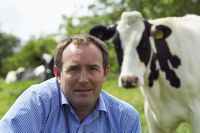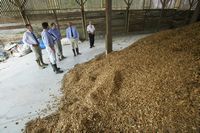Farm Manager of the Year finalists – George Perrott

This year’s Farm Manager of the Year finalists combined imagination, excellent technical ability, and sound business management. Ian Ashbridge reports
The Judges
Cheffins consultant David Bolton, FW’s Ian Ashbridge and 2006 Farm Manager of the Year Adrian Cannon.
The criteria
*Vision for the future of the industry
*Profitable and efficient system
*Environmental and social responsibility
*Innovation and imagination
*Marketing and purchasing strategy
George Perrott – Clinton Devon Estates, Colaton Raleigh, Devon
 Some people possess a seemingly limitless energy and an anything-is-possible attitude. George Perrott is such a man. “There’s always more to do. There are never enough hours in the day.”
Some people possess a seemingly limitless energy and an anything-is-possible attitude. George Perrott is such a man. “There’s always more to do. There are never enough hours in the day.”
His grandfather was a Wiltshire dairyman who took the plunge and took on a commercial smallholding at Sherborne, Dorset, a business that grew when George’s father joined with 200 cows and 150 outdoor sows. It left the young George determined to farm.
After agricultural college at Seale-Hayne – “the best three years of my life” – George returned home, but quickly discovered he had “outgrown the position”. He flirted with the idea of joining one of the big farm management companies, but the appeal of a family-owned estate drew him to Baron Clinton’s Devon estate at Colaton Raleigh near Sidmouth. He has never looked back.
George’s arrival coincided with a major change of policy on the estate and a new board of trustees. He faced the daunting task of eliminating the farm’s £750,000 overdraft and turning the in-hand farming operation into a benchmark for the estate’s tenants. No mean feat.
George’s farming operation pays no rent to the overall estate, but it does extract a £30,000 a year management fee. He reports to an estates director and has overall responsibility for all the operations of the Clinton Devon Farm Partnership.
George has proved he isn’t afraid to take tough decisions to ensure a profitable, sustainable business. In his first two weeks he faced taking 8 people off the payroll, slashing labour costs by £100,000 a year.
Another brave decision has been to enter organic conversion across the entire estate. Next year’s harvest all qualify for in-conversion status. But this has not been a decision taken on a whim – George is a commercial man and recognises the opportunities for tapping into an under-supplied, premium market.
However, you sense that organic farming disciplines have begun to grow on him. “We will be more dependent on slurry. But if we can get organic chicken muck [from a nearby unit] it will be like Nitram in the trailer.”
 But George has seen the possibilities of a less intensive approach to energy use, and not just in his farming operations. The farms now boast the south-west’s biggest woodchip fuel store for biomass boilers, converted from old cattle sheds.
But George has seen the possibilities of a less intensive approach to energy use, and not just in his farming operations. The farms now boast the south-west’s biggest woodchip fuel store for biomass boilers, converted from old cattle sheds.
Business management systems reflect George’s thorough but uncomplicated approach. Business budgets are prepared on a working cash flow basis, rather than projected profit-and-loss accounts. These are measured, budget against actual, on a monthly basis. He has only received secretarial support since last Christmas.
“I have 100% faith in this industry to produce the best but there is a niche for organic food too.”
George’s challenge is to run, as a cohesive whole, an estate where the average field size is just 11 acres. He also faces over 120km of hedgerows of which about 40km are double-sided. The estate’s new, organic status means Entry Level Stewardship plans will have to be re-submitted, but at a return of £60,000, it will be worth it.
As an employer, Clinton Devon Estates is an accredited Investor in People and getting the best from his staff is something George is passionate about. All staff have individual development plans. “I’ve really come to appreciate the value of annual appraisals with staff. I want to see 100% from people, 80% of the time, not the other way around.”
The next challenge for George’s management will be dealing with the results of an in-depth study to assess the farms’ carbon footprint, already underway. Other greener projects include biofuel production – all non-red-diesel farm vehicles run on biodiesel and affordable housing projects.
With the tourist population flooding the Devon coast each year, George hasn’t overlooked the chance to explain what farmers do to the public. Each field gate carries a laminated card, stating to passers-by the crop’s identity, variety and eventual use. It leaves the reader in no doubt – these are people proud of what they do.
| Farm Facts |
|---|
|
| What the judges liked |
|---|
|

